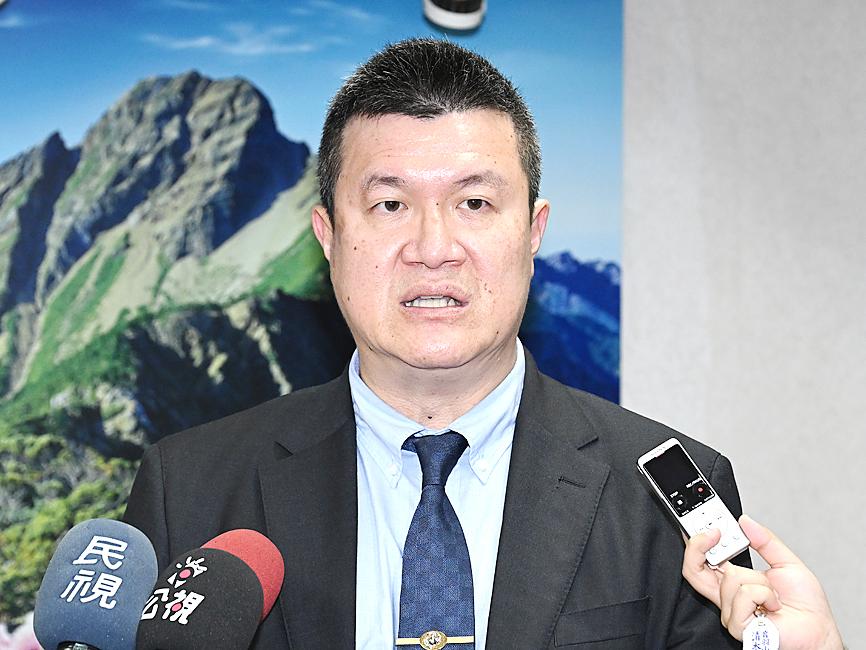The Ministry of Interior yesterday said that it was seeking to forcibly disband the China Unification Promotion Party (CUPP), adding that it would present evidence the party developed organizations and interfered in elections on behalf of China.
The CUPP has engaged in organized activities on behalf of the Chinese Communist Party (CCP) that infringed on people’s rights and endangered Taiwan’s free and democratic order, the ministry said in a statement.
It accused the party of crimes, including contraventions of the National Security Act (國家安全法), the Anti-Infiltration Act (反滲透法), the Presidential and Vice Presidential Election and Recall Act (總統副總統選舉罷免法) and the Act Governing Relations Between the People of the Taiwan Area and the Mainland Area (台灣地區與大陸地區人民關係條例).

Photo: Liao Chen-huei, Taipei Times
The ministry said there are eight cases involving 11 people from 2010 to this year, with police agencies suspecting that up to 134 party members have breached the Criminal Code, the Social Order Maintenance Act (涉違反刑法) and the Organized Crime Prevention Act (組織犯罪防制).
The illegal activities range from obstruction of justice to human trafficking and homicide, it said.
The comments came only two days after prosecutors charged CUPP members Chang Meng-chung (張孟崇) and his wife, Hung Wen-ting (洪文婷), for allegedly receiving NT$74 million (US$2.3 million) from the CCP to make propaganda promoting its political agenda and influencing elections in Taiwan.
Although it is legal to form political parties, they should abide by the Constitution and conform to democratic principles, the ministry said, adding that the CUPP’s alleged crimes jeopardize national security, social order and fairness in elections.
If a party’s purpose or conduct undermines the nation, or its free and democratic order, then it is unconstitutional and authorities can ask the Constitutional Court to dissolve it, the ministry said.
Sixty political parties have applied to disband since the Political Parties Act (政黨法) was promulgated on Dec. 6, 2017, due to a loss of members, funding issues or other reasons, ministry data showed.
Deputy Minister of the Interior Ma Shi-yuan (馬士元) said that evidence related to CUPP would be transferred to the Constitutional Court, adding that would be the first time it would review such a case.
The law applies to top members of political parties and should be enforced to protect Taiwan’s freedom and democracy, Ma said.

INVESTIGATION: The case is the latest instance of a DPP figure being implicated in an espionage network accused of allegedly leaking information to Chinese intelligence Democratic Progressive Party (DPP) member Ho Jen-chieh (何仁傑) was detained and held incommunicado yesterday on suspicion of spying for China during his tenure as assistant to then-minister of foreign affairs Joseph Wu (吳釗燮). The Taipei District Prosecutors’ Office said Ho was implicated during its investigation into alleged spying activities by former Presidential Office consultant Wu Shang-yu (吳尚雨). Prosecutors said there is reason to believe Ho breached the National Security Act (國家安全法) by leaking classified Ministry of Foreign Affairs information to Chinese intelligence. Following interrogation, prosecutors petitioned the Taipei District Court to detain Ho, citing concerns over potential collusion or tampering of evidence. The

Seventy percent of middle and elementary schools now conduct English classes entirely in English, the Ministry of Education said, as it encourages schools nationwide to adopt this practice Minister of Education (MOE) Cheng Ying-yao (鄭英耀) is scheduled to present a report on the government’s bilingual education policy to the Legislative Yuan’s Education and Culture Committee today. The report would outline strategies aimed at expanding access to education, reducing regional disparities and improving talent cultivation. Implementation of bilingual education policies has varied across local governments, occasionally drawing public criticism. For example, some schools have required teachers of non-English subjects to pass English proficiency

NEGOTIATIONS: The US response to the countermeasures and plans Taiwan presented has been positive, including boosting procurement and investment, the president said Taiwan is included in the first group for trade negotiations with the US, President William Lai (賴清德) said yesterday, as he seeks to shield Taiwanese exporters from a 32 percent tariff. In Washington, US Trade Representative Jamieson Greer said in an interview on Fox News on Thursday that he would speak to his Taiwanese and Israeli counterparts yesterday about tariffs after holding a long discussion with the Vietnamese earlier. US President Donald Trump on Wednesday postponed punishing levies on multiple trade partners, including Taiwan, for three months after trillions of US dollars were wiped off global markets. He has maintained a 10 percent

TRADE: The premier pledged safeguards on ‘Made in Taiwan’ labeling, anti-dumping measures and stricter export controls to strengthen its position in trade talks Products labeled “made in Taiwan” must be genuinely made in Taiwan, Premier Cho Jung-tai (卓榮泰) said yesterday, vowing to enforce strict safeguards against “origin laundering” and initiate anti-dumping investigations to prevent China dumping its products in Taiwan. Cho made the remarks in a discussion session with representatives from industries in Kaohsiung. In response to the US government’s recent announcement of “reciprocal” tariffs on its trading partners, President William Lai (賴清德) and Cho last week began a series of consultations with industry leaders nationwide to gather feedback and address concerns. Taiwanese and US officials held a videoconference on Friday evening to discuss the